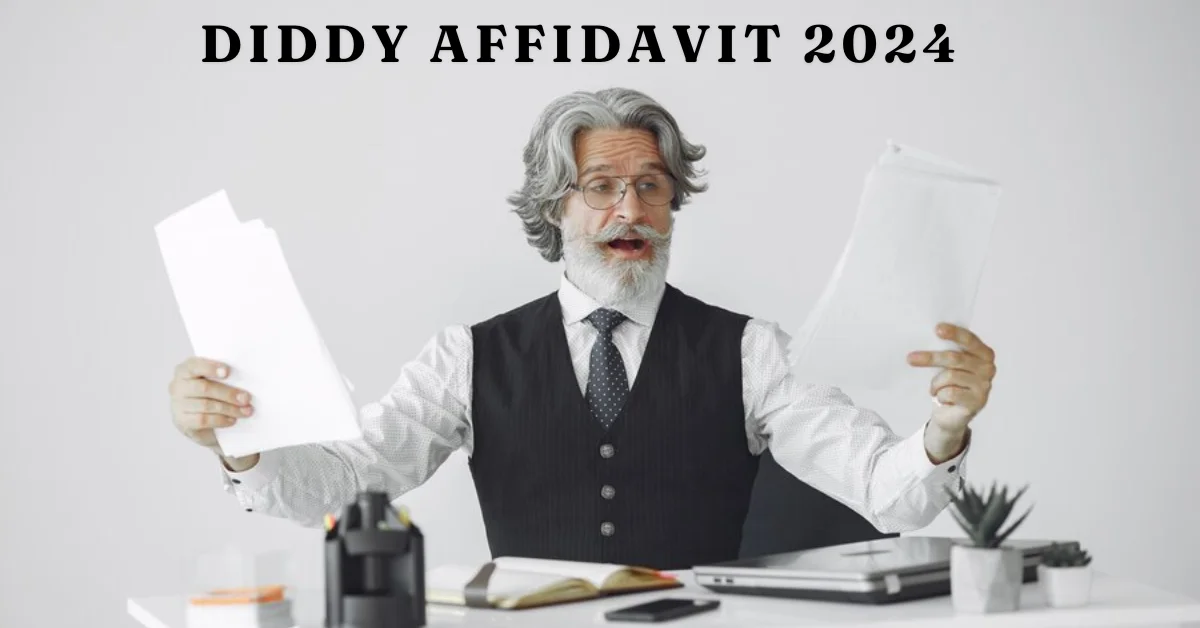The Diddy Affidavit 2024: Key Changes and What They Mean for Legal Practice
The Diddy Affidavit 2024 has garnered significant attention due to its implications in legal circles and beyond. Introduced as a tool to streamline evidence collection and improve transparency, it represents a major advancement from previous versions. This article delves into its details, legal implications, and the broader impact it could have on legal proceedings.
Affidavits, as sworn statements of truth, play a crucial role in legal processes. They ensure the credibility and accuracy of information presented in court and other legal contexts. The Diddy Affidavit 2024 builds on this foundation with the goal of enhancing the efficiency and reliability of legal documentation.
What is a Sworn statement?
A testimony is a written statement made under oath or affirmation, commonly used as evidence in court. It serves as a way for individuals to present facts they believe to be true, with the understanding that providing false information can lead to charges of perjury. Essentially, a testimony allows people to formally declare what they know or have witnessed, providing a crucial component in legal proceedings to establish the truth and support or refute claims made in a case. This process ensures that the information presented is reliable and holds legal weight, as individuals are legally bound by the accuracy of their statements.
Significance of Oaths in Legal Actions
Oaths play a crucial role in legal settings for several important reasons. They offer a formal method for presenting evidence and documenting facts that can significantly influence legal outcomes. By requiring individuals to swear or affirm the truthfulness of their statements, oaths help ensure the integrity of the legal process.
This formal commitment to honesty is essential for maintaining trust in legal proceedings. When people make sworn statements, they are legally bound to provide accurate information, knowing that falsehoods can lead to serious consequences like charges of perjury. This system helps to uphold the credibility of the evidence and the fairness of the judicial system, ensuring that decisions are based on truthful and reliable information. The use of oaths thus reinforces the accountability of witnesses and parties involved, contributing to a more just and orderly legal process.
Guaranteeing Validity and Veracity
Swearing an oath or making an affirmation to tell the truth significantly boosts the credibility of the information provided in legal statements. This solemn act underscores the seriousness with which individuals make their declarations. By formally committing to honesty, those giving testimony or evidence are bound by law to provide accurate and truthful information. This grave and formal procedure serves to emphasize the integrity of their statements, ensuring that the information presented is reliable and can be trusted in legal proceedings. The process not only reinforces the accountability of those involved but also helps maintain the overall fairness and effectiveness of the judicial system.
Job in Proof Assortment
Sworn statements facilitate the collection of evidence by allowing individuals to formally document their observations, experiences, or knowledge relevant to a case. When someone provides a sworn statement, they are putting their information in writing and affirming its truthfulness under oath. This process ensures that their accounts are recorded accurately and can be relied upon during legal proceedings.
These documented statements can then be presented as evidence in trials or hearings. The formal nature of sworn statements adds a layer of credibility, as the person providing the information is legally bound to be truthful. This helps ensure that the evidence is both reliable and integral to the case, contributing to a fair and thorough examination of the facts. By recording and swearing to their statements, individuals help create a robust record that supports the legal process and assists in achieving just outcomes.
Foundation and Setting
The Diddy Affidavit 2024 represents a significant evolution in the practice of taking oaths. Named after its principal creator, this updated affidavit seeks to rectify shortcomings found in previous versions while aligning with the current demands of the legal landscape.
This new iteration introduces several improvements designed to enhance the accuracy and efficiency of sworn statements. By addressing past limitations, the Diddy Affidavit 2024 aims to provide a more robust framework for documenting and presenting evidence. It reflects modern legal needs, incorporating advanced methods to ensure that affidavits are more reliable and better suited to contemporary legal practices.
Overall, the Diddy Affidavit 2024 is a response to the evolving complexities of the legal system, offering a refined tool that enhances the clarity and effectiveness of legal documentation. This update underscores the commitment to improving how oaths are administered and used, ensuring that they meet the rigorous standards of today’s judicial requirements.
Key Components and Importance
Key features of the Diddy Affidavit 2024 include enhanced security measures, standardized formatting, and provisions for electronic submission. These improvements are designed to boost the efficiency and reliability of affidavits in legal contexts.
Enhanced Security Measures: The Diddy Affidavit 2024 introduces advanced security protocols to safeguard the integrity of sworn statements. These measures ensure that the information is protected from tampering and unauthorized access, thereby maintaining the authenticity of the evidence presented.
Standardized Formatting: The affidavit now follows a uniform format, making it easier to prepare, review, and process. This standardization helps streamline legal procedures by providing a consistent structure that reduces errors and facilitates quicker handling of documents.
Electronic Submission: The new affidavit accommodates electronic filing, allowing for faster and more convenient submission. This feature reflects modern practices and addresses the need for digital solutions in legal documentation. By enabling electronic submission, the affidavit ensures that documents can be efficiently shared and accessed, reducing delays and improving overall workflow.
Together, these enhancements aim to improve the accuracy, security, and efficiency of affidavits, making them a more reliable tool in legal proceedings.
Influence on Current Legitimate Cases
The introduction of the Diddy Affidavit 2024 has already made a significant impact on ongoing legal cases. Courts are increasingly relying on its updated features for handling evidence.
This new affidavit has been embraced by the legal community for its advanced security measures, standardized format, and provisions for electronic submission. These improvements have streamlined the process of submitting and managing evidence, leading to greater efficiency in court proceedings.
As more courts adopt the Diddy Affidavit 2024, its influence continues to grow. Legal professionals and judges are finding that its enhancements facilitate smoother operations and reduce administrative burdens. The shift towards this modernized affidavit is transforming how evidence is presented, making legal processes more transparent and effective. The Diddy Affidavit 2024 is thus playing a crucial role in evolving legal practices and improving the overall handling of legal documentation.
Likely Future Applications
Looking ahead, the Diddy Affidavit 2024 has the potential to set a new standard for the future of oath-taking and legal documentation. Its innovative features could pave the way for further regulatory reforms and technological advancements in the field.
As legal professionals and courts continue to adopt and adapt to the Diddy Affidavit 2024, its impact may inspire similar updates to other aspects of legal documentation. This could lead to broader changes in how oaths and affidavits are handled, with a focus on improving efficiency, security, and accessibility.
Moreover, the success of the Diddy Affidavit 2024 might drive the development of new technologies and methods for managing legal documents. These advancements could further streamline processes, reduce errors, and enhance the overall integrity of legal proceedings. In essence, the Diddy Affidavit 2024 could act as a catalyst for ongoing innovation in legal practices, setting the stage for future improvements in how legal evidence is documented and processed.
Contextual investigations and Models
Examining past instances where sworn statements have played a crucial role highlights their significant impact on legal decision-making processes. Sworn statements, or affidavits, often carry substantial weight in court proceedings. Judges and legal professionals rely on the content of these statements when assessing the validity of claims or defenses presented in a case.
For example, in many legal scenarios, the accuracy and reliability of sworn statements can heavily influence the outcome of a trial. Whether it’s a matter of establishing facts, verifying witness accounts, or corroborating evidence, these statements are integral to the judicial evaluation process. Courts use them to determine the credibility of the information provided and to make informed decisions based on the evidence at hand.
In essence, the role of sworn statements extends beyond mere documentation; they are pivotal in shaping the legal narrative and influencing judicial outcomes. The thorough consideration of these statements underscores their importance in ensuring that legal proceedings are conducted fairly and that justice is served.
Legal Translations
Legal translations of sworn statements can vary widely, influenced by the specific practices and legal precedents of different jurisdictions. This variability can have significant implications for both legal professionals and individuals involved in formal legal processes.
In each jurisdiction, the approach to translating sworn statements may reflect local legal traditions, procedural requirements, and cultural nuances. For instance, what is considered an acceptable format or content for a sworn statement in one country might differ in another. These differences can affect how evidence is presented, interpreted, and evaluated in court.
For legal professionals, understanding these jurisdictional variations is crucial. It ensures that sworn statements are accurately translated and properly aligned with local legal standards. This knowledge helps prevent misinterpretations that could impact the effectiveness of the evidence or the fairness of the proceedings.
For individuals involved in legal matters, awareness of how sworn statements are translated can aid in navigating the complexities of legal documentation. It ensures that their statements are presented in a manner that is both legally compliant and effective in supporting their case.
Overall, grasping the nuances of legal translations of sworn statements is essential for maintaining the integrity of legal processes and ensuring that all parties are adequately represented and understood in court.
Steps Engaged with Drafting a Substantial Sworn statement
Drafting an oath requires meticulous attention to detail to ensure that the statements accurately reflect the facts at hand. It’s essential to craft the language with clarity and precision to prevent any misunderstandings or misinterpretations.
When preparing an oath, each declaration must be carefully considered to ensure it truthfully represents the events or information being sworn to. Clear and accurate language is crucial, as even minor ambiguities can lead to confusion or disputes. Misinterpretations can undermine the reliability of the affidavit and affect its effectiveness in legal proceedings.
To achieve this, it’s important to use straightforward, unambiguous language that leaves no room for doubt. This involves not only being precise in how facts are presented but also ensuring that the statements align with legal standards and expectations. The goal is to provide a document that can be easily understood and verified, supporting the integrity of the legal process.
Overall, careful drafting of an oath is key to maintaining its validity and ensuring that it serves its intended purpose in legal contexts.
Legally approbation and Witness Necessities
To validate a sworn statement, it often needs to be endorsed by an authorized official or witnessed by individuals who can confirm the identity of the person making the statement and their commitment to truthfulness.
Typically, this process involves the following steps:
- Authorization by a Certified Authority: The statement may need to be approved by a recognized authority, such as a notary public or a legal officer. This person verifies that the document meets all legal requirements and that the person signing the statement is indeed who they claim to be.
- Witness Certification: In some cases, witnesses are required to attest to the authenticity of the statement. They confirm that the person making the statement did so willingly and with full understanding of the importance of telling the truth. The witnesses also validate that the individual was properly identified and that the statement was signed in their presence.
These steps are crucial in ensuring that the sworn statement is both credible and legally binding. The involvement of authorized individuals or witnesses helps to uphold the integrity of the document and reinforces its reliability as evidence in legal proceedings. By verifying the identity of the person making the statement and their commitment to honesty, the legal system ensures that all information presented is accurate and trustworthy.
Dissecting the Substance of the Diddy Affidavit 2024
Comparing the Diddy Affidavit 2024 to previous versions reveals several significant updates in its design, content requirements, and submission methods.
Design Updates: The Diddy Affidavit 2024 introduces a streamlined and modernized design that improves clarity and ease of use. The new format is more user-friendly, with organized sections and clear headings that guide users through the document. This updated design helps ensure that all necessary information is included and presented in a logical, coherent manner.
Content Requirements: This latest version has revised content requirements to enhance accuracy and comprehensiveness. It now includes more detailed guidelines on what information must be provided, ensuring that all relevant facts are captured and clearly articulated. These changes aim to reduce ambiguity and ensure that affidavits are more precise and aligned with current legal standards.
Submission Methods: The Diddy Affidavit 2024 also updates its submission processes to reflect modern practices. It incorporates provisions for electronic submission, allowing for faster and more efficient handling of documents. This adaptation acknowledges the growing reliance on digital tools in legal procedures and facilitates smoother processing and accessibility.
Overall, these updates in the Diddy Affidavit 2024 are designed to make the process of preparing and submitting sworn statements more effective and efficient, aligning with contemporary legal practices and technological advancements.
Assessing Changes and Updates
Examining the changes introduced in the Diddy Affidavit 2024 provides valuable insights into the intended improvements and potential challenges associated with its implementation.
Intended Enhancements
- Improved Design and Usability: The updated design aims to make the affidavit easier to navigate and complete. With a more intuitive layout and clearer instructions, users are expected to find it simpler to provide accurate and comprehensive information.
- Enhanced Content Requirements: By setting more detailed content standards, the Diddy Affidavit 2024 seeks to ensure that affidavits are more precise and aligned with current legal expectations. This is intended to reduce errors and inconsistencies, improving the overall reliability of sworn statements.
- Modernized Submission Processes: The incorporation of electronic submission options reflects the shift towards digital solutions in legal documentation. This enhancement is designed to streamline the submission process, making it faster and more efficient while increasing accessibility for all parties involved.
Expected Challenges
- Adaptation to New Formats: Legal professionals and individuals may face a learning curve as they adjust to the new design and content requirements. Training and familiarization with the updated format could be necessary to fully leverage the improvements.
- Integration with Existing Systems: Adapting to the new electronic submission processes might require updates to existing legal workflows and systems. Ensuring that these systems can accommodate the changes without causing disruptions will be crucial.
- Consistency Across Jurisdictions: Different jurisdictions may have varying requirements and practices related to sworn statements. Ensuring that the Diddy Affidavit 2024 is effectively integrated into diverse legal frameworks and consistently applied can pose a challenge.
In summary, while the Diddy Affidavit 2024 introduces significant enhancements aimed at improving efficiency and accuracy, the transition to these new standards will require careful management to address potential challenges and ensure successful implementation.
Media’s Job in Dispersing Data
News sources play a crucial role in educating the public about legal developments, such as the Diddy Affidavit 2024. Their coverage helps shape public awareness and understanding of these changes, influencing how they are perceived and applied.
Informing the Public
- Explaining Complex Changes: News outlets break down the complexities of new legal documents and procedures for a general audience. By providing clear and accessible explanations, they help people grasp the significance of updates like the Diddy Affidavit 2024.
- Highlighting Implications: Through articles and reports, the media outlines how such changes may impact individuals and businesses. This coverage helps stakeholders understand the practical effects of the new affidavit on legal practices and documentation.
- Offering Expert Insights: News sources often feature expert opinions and analyses that provide deeper context and interpretations of legal updates. These insights can clarify how the Diddy Affidavit 2024 fits into broader legal trends and reforms.
Shaping Public Perception
- Framing the Narrative: How the media presents legal changes can influence public perception. Positive or negative framing of the Diddy Affidavit 2024 can affect how people view its effectiveness and relevance.
- Driving Discussion: By covering the Diddy Affidavit 2024, news sources generate public discourse around its implementation and potential challenges. This dialogue can shape opinions and drive further scrutiny or support.
- Educating and Engaging: Regular coverage helps keep the public informed and engaged with ongoing legal reforms. This engagement is crucial for fostering an informed citizenry that can actively participate in discussions about legal and policy changes.
In summary, news sources are essential in disseminating information about legal advancements like the Diddy Affidavit 2024. They help demystify legal updates, influence public opinion, and promote a better understanding of how such changes affect individuals and society at large.
Public Discernment and Assessment
Public reactions to the Diddy Affidavit 2024 reveal a range of concerns, particularly around security, transparency, and the reliability of electronic submissions.
Security Concerns: Many people are worried about the safety of submitting affidavits electronically. They question whether digital platforms are secure enough to protect sensitive information from unauthorized access or cyber threats. Ensuring robust security measures is a major concern for those who need to trust that their confidential data remains protected.
Transparency Issues: There is also a focus on how transparent the new system will be. The public wants to know how the electronic submission process will be monitored and audited to ensure fairness and accuracy. Clear guidelines on how submissions are handled and tracked are crucial for building trust in the system.
Reliability of Digital Submissions: The reliability of electronically submitted affidavits is another significant concern. People are questioning whether the new digital formats will be as reliable as traditional paper documents. They are concerned about potential technical issues, such as data loss or system failures, that could impact the validity of their submissions.
Overall, these public responses highlight the need for addressing these concerns through enhanced security protocols, transparent processes, and reliable technology to ensure that the Diddy Affidavit 2024 meets the expectations and needs of all users.
FAQ
1. What is the Diddy Affidavit 2024?
The Diddy Affidavit 2024 is a revised version of legal affidavits designed to improve the efficiency and reliability of sworn statements. It introduces updates in design, content requirements, and submission methods.
2. What are the main changes in the Diddy Affidavit 2024 compared to previous versions?
The Diddy Affidavit 2024 features a more user-friendly design, updated content requirements for better accuracy, and new electronic submission options to streamline the process.
3. How does the new design of the Diddy Affidavit 2024 benefit users?
The updated design enhances clarity and organization, making it easier for users to complete the affidavit correctly and efficiently.
4. What improvements have been made in content requirements?
The affidavit now includes more detailed guidelines on the information to be provided, aiming to ensure that affidavits are more precise and aligned with current legal standards.
5. How does the Diddy Affidavit 2024 handle electronic submissions?
The new version allows for electronic submissions, which are intended to speed up the process and integrate with modern digital practices. This includes updated protocols for secure and reliable online filing.
6. What concerns have been raised about the Diddy Affidavit 2024?
Public concerns include the security of electronic submissions, the transparency of the submission process, and the reliability of digital formats. These issues highlight the need for strong security measures and clear, dependable systems.
7. How might the Diddy Affidavit 2024 influence future legal documentation practices? The Diddy Affidavit 2024 could set a precedent for future updates in legal documentation, driving further innovations and regulatory changes in how affidavits and similar documents are handled.
Keep an eye for more news & updates on Don Guides!






